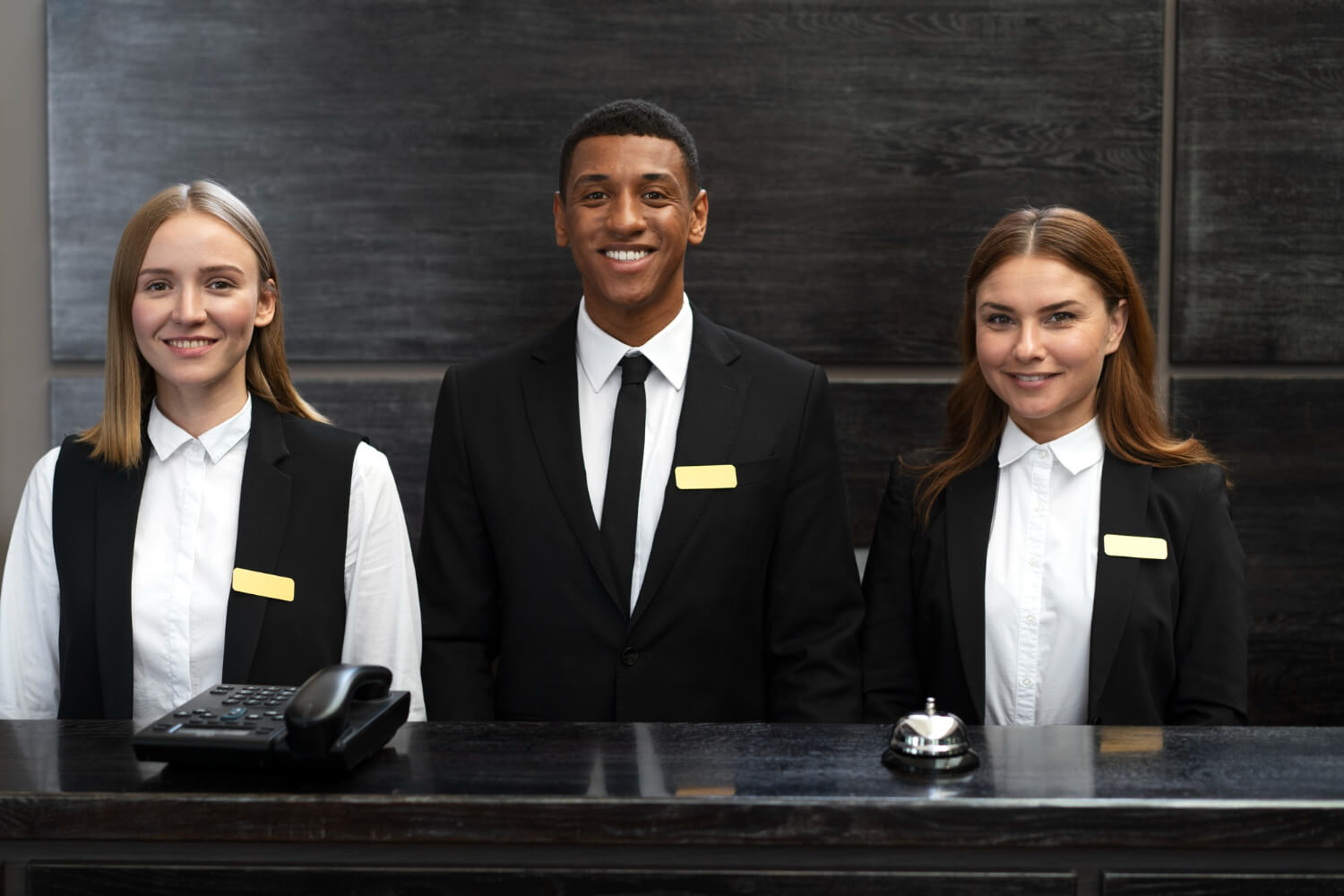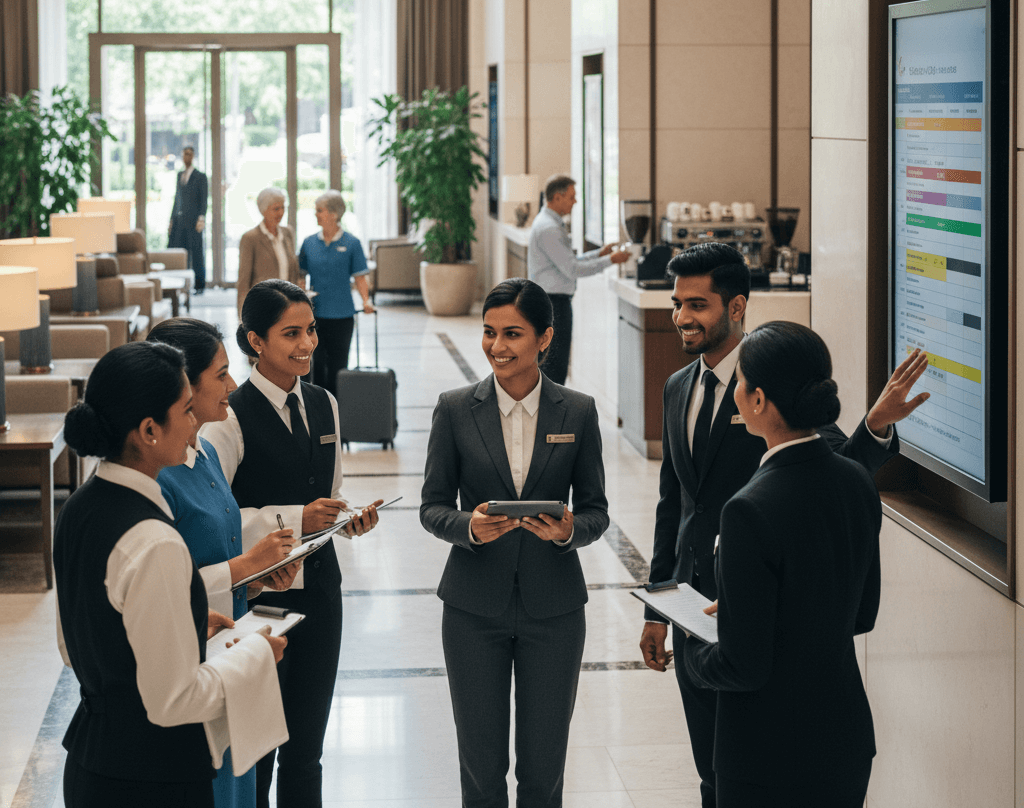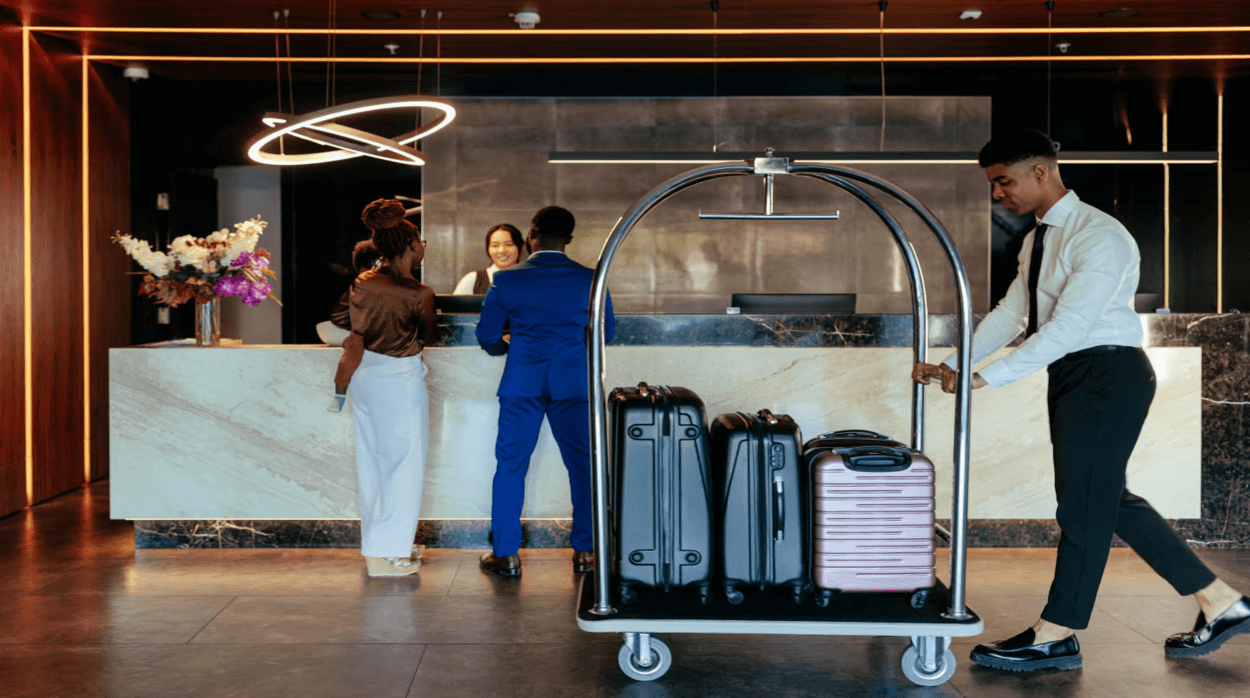Why Hotels in India Need a Staff App
The rapid transformation of India’s hotel industry is impossible to ignore, and it raises a vital question: Why Hotels in India Need a Staff App to handle today’s operational challenges. While still rising to the challenges and new realities of post-pandemic operations and an increasing influx of international visitors alongside robust domestic travel, the need for instant, streamlined, and effective digital communication between hotel departments has never been sharper. Modern communication methods of email, scheduled calls, and physical rounding still wouldn’t cut it.
This is where the Staff App comes in.
A hotel staff management app is no longer something that is simply desirable. It is an absolute necessity that provides the much needed digital backbone for effective interdepartmental silo busting and cohesive communication, task performance, challenge identification and resolution, and overall consistency of operations. It doesn’t matter if it is a housekeeper changing the status of the room to clean, or a receptionist sending an alert to engineering that an AC is faulty—everything now is captured, monitored, and resolved on a single platform.
Similar to the improving realities in India’s metro and tier two towns, hotels are also increasingly having to contend with a younger, more challenging set of employees. The realty is that the talent and consumer matrix is more intricate, with higher demand for faster and more specialized delivery of services And this is no longer possible through the use of obsolete tools.
In this blog, we present the top ten reasons that explain the imperative for having a staff app presented, and the implications on income realised, customer satisfaction, and team responsibility will explain it.
In the next section we will present the essential details.
2. What is a Staff App and How Does it Work?
A staff app is a mobile and/or web-based software employed in the hospitality industry from the operational level, and it allows real time communication with team members, real-time issue reporting, and real-time accountability fulfillment among other functionalities.
Consider a scenario in which a guest calls the house keeping department to request additional towels. Rather than the front desk receiving a call and making note of it in a book, they are able to log it within the app. The house keeping department is able to receive a notification, and after fulfilling the request, is able to mark it as completed. The entire process is timestamped, trackable, and visible to supervisors, so nothing goes unnoticed.
Most hotel staff management apps come equipped with the following features:
- Departmental chat
- Shift hand overs
- Task management
- Room status updates
- Real-time notifications
- Issuse escalation
- Analytics dashboards
- Users include:
- Front Office
- Housekeeping
- Food and beverage service as well as the kitchen
- Engineering
- Maintenance
- Concierge
- Security
Kiwi and other similar apps eliminate the constant need for radios and log books, as well as the need for sticky notes and physical logbooks. Some more sophisicated apps even allow integrations with PMS systems, IoT, guest applications, and hotel CRM’s.
In India, where labor turnover is extremely high, English is not the first language for a majority of the population, and staff application is multi-lingual, with a simple user interface and easy to understand training videos, which greatly reduces the burden of onboarding.

Checkout: Omnichannel Communication in Hotels
3. The Issues with Conventional Forms of Communication
Let’s face it. Numerous Indian hotels continue to function using WhatsApp, walkie-talkies, and physical logbooks. While this operating method sufficed for a decade, it is now quite detrimental for productivity and efficiency.
The typical problems include:
- Tasks are either undocumented or lost in multiple chat conversations.
- No one seems to take ownership of particular tasks. For instance, who was responsible to resolving the AC issues in Room 301?
- Walkie-talkies are largely antiquated, do not capture or retain data, and are a primary source of noise pollution.
- Shift handovers are tedious and ill-structured, thereby leading to confusion for incoming staff.
- Managers are in the dark, without access to usable data, and are forced to engage in manual surveys to evaluate progress.
The results of these issues are:
- Guest servicing delays
- Accountability issues among the staff
- Internal and external miscommunication
- Revenue loss as a results of unresolved complaints and issues
- In addition to these, there is a considerable, if not total, lack of documentation.
In today’s competitive world, using traditional methods to operate is not a good idea—and it clearly highlights why hotels in India need a staff app instead of outdated tools like WhatsApp or walkie-talkies. Negative reviews, loss of staff morale, and not achieving the target goals are all very possible outcomes.
In this case, a staff application is far more efficient, as it is capable of predicting and resolving these issues.
4. What Are The Benefits of Using Hotel Staff Management App?
Every hotel staff management app comes with certain benefits of using hotel staff management app . Some of these are discussed below.
Timely Notifications
Every task is assigned and completed real time—none of the staff members are idle.
Increased Accountability
Every task is time-stamped and followed up until completion—there are no “I wasn’t aware” statements.
Increased Efficiency
Engineering response times are lower and room turn-over times are higher with lesser overall errors and confusion.
Increased Guest Satisfaction
Better internal coordination and communication results in improved response times for resolving guest issues.
Staff Productivity
No questions or confusion leads to targeted staff effort and staff know exactly what needs to be done.
Improved Control
Overseers no longer need to physically monitor the entire hotel in order to see what custom and untidy or in absence of task done. They are able to use real-time dashboards for most of these monitoring features to supervise the unit.
Simple Shift Handover
New staff members can easily access the previous shifts’ notes and open tickets with no confusion.
Improved Business Intelligence
Business analytics and analytics on staff performance are now merged. Commonly occurring issues during peak hour requests are also analyzed.
Supports Multiple Languages
Using other languages other than English in a country like India allows for a more inclusive workplace.
Minimal Guest Issues
Fewer mistakes means advanced operational systems result in better employee performance.
In simple terms, moving from a reactive system to a proactive system is what most staff communication app for hotels do.
The Indian hospitality context: Why this is so critical
India’s hotel industry is booming — but it’s also quite different.
High staff turnover: Training new staff can be time consuming. It also serves as a guide to be used by all staff.
Variety of languages: Language barriers can both interrupt and interfere with internal communication, from South India to North-East. A multilingual interface solves this.
Tech-savvy guests: They want service now — and they want to track requests. They’re not going to wait 30 minutes for a towel.
Skinny margins: It is particularly common in budget or midrange hotels. Reducing inefficiencies means protecting profits.
Operational discrepancies: Many chain hotels have difficulty maintaining consistent quality of service across different locations.
In that context, the answer to why hotels in India need a staff app becomes clear: it’s not just a digital tool but the foundation of brand consistency and guest experience.

Checkout: The Role of Data Analytics in Optimization Hotel Operations
6. The quicker you can turn over a room, the more money you can make.
With a staff app, housekeeping is immediately notified when a guest checks out. They start cleaning, mark the room ready when they’re done, and the front desk gets a ping. This reduces time waste between check-out and check-in. India hotels, particularly during peak periods or weekends, those extra 30 minutes per room can mean more bookings, less delays, and more revenue. Staff apps remove the lag of verbal updates or manual checks. Anything you can do faster to clean a room and flip it is money back in your business. Oh, and when visitors are checking in early as a consequence? That’s a five-star review in the works.
7. No more playing the “he said, she said” game
Miscommunication remains one of the top reasons tasks fall apart in Indian hotels, sometimes over something as small as forgetting the extra towels. A staff app for hotels cuts out the guesswork, so you’re not relying on what someone heard in the hallway. Everyone in the chain can see the tasks, which pop up online with a clear time stamp. No more “I didn’t know” or “I thought someone else was handling it.” If the AC’s been down for three hours, the app tells you exactly who got the task and the moment it was bumped up the chain.
This kind of transparency builds trust, heads off finger-pointing, and catches mistakes while they’re still small—before a guest posts that one-star review. It also helps team leads and GMs run fair, data‑driven performance reviews, backed by clear numbers and facts you can point to.
When a guest speaks up—about a missing towel or the steady drip of a tap—how quickly you fix it can make all the difference in their stay. The staff app logs issues the moment they happen and kicks them up the chain right away if no one fixes them within the set time limit. If a housekeeping task isn’t wrapped up within 20 minutes, the system pings a supervisor—like a quick buzz on their phone.
It keeps tasks from slipping through the cracks, like a note stuck to the fridge where you can’t miss it. In Indian hotels that usually fix problems only after they happen, this system flips the script—staff step in early, turn small issues into wins, lift ratings, cut bad reviews, and leave guests feeling genuinely looked after.
A centralized task board keeps the whole team on the same page—like a living dashboard where you can see, at a glance, which rooms still need fresh towels or a quick clean. From F&B to security, every department can pull up everything at once—ongoing tasks, unresolved issues, room statuses, even handovers—on a single, clear screen. With everything visible in one place, teams can easily coordinate across departments and steer clear of silos—like sharing one clear map instead of scattered scraps.
If housekeeping notes the minibar’s empty—say, the last soda’s gone—the front desk can bill it right away. It helps the team stay on the same page and avoids extra calls or redoing the same task, like answering the same question twice in one morning. In India’s fast-paced hospitality scene, where juggling tasks is part of the daily grind, a task board keeps the team on track—like a chalkboard covered in neat, colorful notes.
Future-Proofing Your Hotel with Technology
India’s hotel scene is stepping into a new era, with lobbies buzzing and fresh designs turning heads. Modern travelers—whether they’re on a quick business trip, relaxing on vacation, or typing away in a café halfway across the world—are seeing their expectations change fast.
They want service that feels tailor-made, answers that land in seconds, and experiences so smooth they barely notice the steps in between. Meanwhile, in the background, they just assume your hotel runs without a hitch, never glimpsing the early-morning bustle in the lobby. That’s where technology steps in—not to take anyone’s place, but to give your team the tools to shine, like handing them a sharper pencil for the job.
To future-proof your hotel, swap out reactive systems for proactive tools, starting with something simple and powerful—a solid staff app that lets housekeeping flag a broken lamp in seconds. In most Indian hotels, operations still run the old-fashioned way—scribbled call logs, thick paper registers, clunky spreadsheets, and crackling walkie-talkie updates. But these systems just don’t stretch far—you hit the ceiling fast, like a ladder that ends three feet short, that is why hotels in India need a staff app.
The moment the rooms start filling up, or someone’s out sick, or a guest suddenly asks for extra linens at midnight—you’re stuck putting out fires. Miss one task, and the ripples spread—until they crash into a stinging, one-star review. Think of the staff app as your hotel’s nervous system, firing off real-time updates and alerts—like a bell ringing in the kitchen—so every department stays on point and nothing gets missed.
The best part? That moment when the room goes quiet and you can hear your own heartbeat. You don’t need a huge pile of cash to dive in—even a few crisp bills can get things moving. Today’s cloud-based staff management tools are budget-friendly, designed for mobile use, and fit perfectly for Indian properties—whether you’re managing a cozy 20-room boutique hotel or a bustling 200-room chain.
With task assignment, checklists, SOPs, multilingual support, and mobile dashboards all in place, even teams who rarely touch tech can jump in and use it—no fuss, no confusion.
Hotels that jump on this shift today will be the ones welcoming packed lobbies and steady bookings five years from now. If you don’t, you’ll be left trailing competitors who move faster, adapt more quickly, and treat their guests with a sharper touch—like remembering a favorite drink before it’s ordered.
You don’t want to run a hotel that feels like a dusty video store while your competitors turn into Netflix. A staff app isn’t just another tool. It’s the lock on the door that keeps your work from slipping into irrelevance.
Building a Competitive Advantage with Better Operations
Guests never see the work humming behind the scenes, but they sense it in the warm smile at the door and the smooth way everything just flows. A late housekeeping visit, missing extra towels from room service, or a drawn-out check-in because the room’s still unmade—each one grates on a guest. Friction snuffs out delight, like grit grinding in a once-smooth gear. That’s why you can’t treat operational excellence as a nice-to-have anymore—it’s as essential as keeping the lights on.
When every hotel promises clean rooms, nice views, and a free breakfast, it’s your staff’s speed and steady reliability—like remembering a guest’s coffee order—that truly sets you apart. That’s the point where a staff app tips the scales in your favor, like having an extra pair of sharp eyes on every detail.
Picture this—a guest picks up the phone and asks for someone to freshen up the room. Rather than having the front desk call housekeeping—who might be on break—or jot it on a sticky note that gets lost, they pop the task straight into the app. It pings the right staff member right away, then logs when the task is accepted, when work begins, and when it’s finally checked off. As the manager, you can watch the progress unfold in real time—like seeing a bar fill up right before your eyes. Guests get their coffee before it cools, the team owns every task, and no one has to ask, “Is it done yet?”
When that rhythm flows through the front desk, housekeeping, F&B, maintenance, and beyond, the whole hotel runs smooth as polished brass. You can see it pop up in reviews, like a faint watermark you almost miss at first glance. You can see it in the way customers come back again and again, like the familiar knock of a friend at your door.
Your team moves through the day with a clear plan, less tension in their voices, and the steady sense they’re steering the ship. You steer clear of trouble before it sparks. You cut down on mistakes, like catching a wrong number before it lands in the report. You quit wrestling with chaos and start creating real brand value, like turning a cluttered desk into a clear, inviting workspace.
These days, guests put more faith in what people write online than in a row of neat little stars. A small glitch in service can spark a sharp remark, and that one jab might keep tables empty for months. But when the experience clicks—like a warm greeting right at the door—it can spark a lasting loyalty to the brand.
That’s how big hotels keep their edge—and now, even small inns can hit harder than their size suggests. You just need a system that pulls your team together, like everyone working off the same clear, shared map. That’s exactly what the staff app does—it’s like having the right tool in your pocket.

Checkout: Staff Management in Hotels
Conclusion: Why iNPLASS Is the Future of Indian Hotel Operations
The year’s 2025, and the air hums with the low buzz of electric cars sliding past. If your hotel’s still juggling task assignments on WhatsApp, tracking complaints in clunky Excel sheets, and flipping through dog-eared SOP printouts, you’re not just working inefficiently—you’re vanishing from the radar of today’s guest. Running a hotel today takes precision, speed, and the ability to handle big operations—and none of that’s possible without a staff management platform keeping every shift and schedule on track.
That’s where iNPLASS comes in, ready to take the reins like a steady hand on the wheel. iNPLASS isn’t just another task tracker—it’s the one that dings when your deadline’s creeping up. Built to tackle the real challenges hotels face—like late-night check-ins or sudden staff changes—it’s India’s most comprehensive staff app for the hospitality industry.
From assigning tasks automatically to showing real-time dashboards, from sending updates in multiple languages to keeping SOPs in one place—iNPLASS makes sure every team member knows what to do, when to do it, and how well they’ve done it, down to the last checkmark. You don’t have to hover over every step.
You don’t have to ring up ten different people just to find out what’s going on. You don’t have to sit around wishing—just watch the work take shape. With iNPLASS, you’ll know the job’s finished, because it tracks every step, pings you when it’s due, and pushes it higher up the chain the moment it’s late.
Whether you manage a 50-room inn in Jaipur or a string of seaside resorts in Goa, iNPLASS delivers enterprise-level efficiency to Indian hotels—minus the steep price tag and tangled setup. Since it’s built for mobile, your team can keep working from anywhere, and you can check in on everything—even from the back seat of a taxi.
And the outcome? When your team’s happy and clear on their roles, guests feel truly cared for—like when a server remembers their favorite drink—and that leads to higher ratings, fewer complaints, loyal staff, stronger profits, and operations that run lean; in the end, what guests carry with them is the experience, not the slogan.
The real experience takes shape behind the scenes, in the tools your team clicks through and leans on every day. The real question isn’t “Should I get a staff app?” – it’s “Can I afford not to?” In hospitality’s future, technology’s as essential as the hum of an espresso machine in the morning. For hotels in India, the future kicks off with iNPLASS – the name you’ll start seeing on lobby screens and check-in desks.






